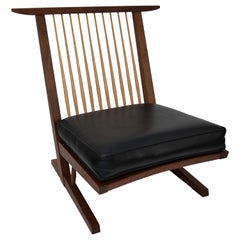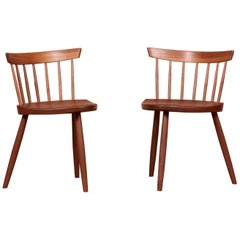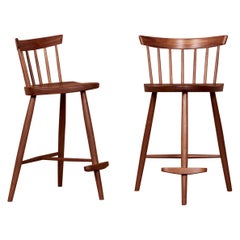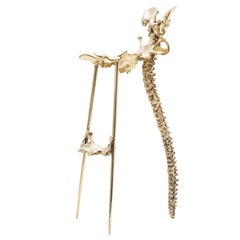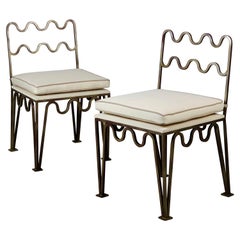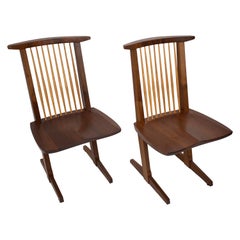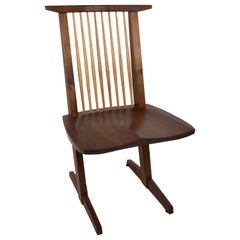Mira Nakashima Chairs
For nearly two decades, Mira Nakashima worked in the shadow of her legendary father, master woodworker George Nakashima. She never intended to follow in his footsteps, but she was persuaded to join him in his woodworking business after earning a graduate degree in architecture from Tokyo’s Waseda University.
“My father was an architect who went to Harvard, didn’t like it and switched to MIT,” Nakashima explains.
“I went to Harvard and loved it. He encouraged me to study architecture, so I did. I would rather have studied music. I was in a dance group and a choral group. After college, my godmother took me on a tour of Zen monasteries in Japan. I went to live there with an aunt to master Japanese, flower arranging and the tea ceremony. Then I went to Waseda University, learning architecture by the atelier system, where you actually build things. I married a fellow student and we began having children. After we moved to Pittsburgh and had more babies, my father asked me if I wanted to come ‘home,’ promising to build us a house near him. My husband liked the idea, so we went. I began to do part-time work for my father. It was just a job. Then my husband and I parted, so I went to work with Dad. It was never planned.”
That part-time position turned into a full-time job, and when George Nakashima died, in 1990, Mira was faced with a choice: continue the family legacy or shutter the business. As news of her father’s death spread, clients started canceling orders, fearing that the studio’s innovation would wane without him at the helm.
Skeptics proved wrong. Mira Nakashima continued to execute her father’s iconic designs — such as his Conoid chair — while also creating new ones of her own that take advantage of and highlight the unique characteristics and allure of her, and her father’s, favored material.
“Keisho means ‘continuation’ in Japanese,” she says. “I am just as interested in traditional lines, classic proportions and fine wood specimens, but I work out my designs differently. The boards tell you what they want to reveal.”
Shop authentic Mira Nakashima tables, case pieces and more on 1stDibs.
Early 2000s American Mira Nakashima Chairs
Walnut
21st Century and Contemporary American Mid-Century Modern Mira Nakashima Chairs
Wood, Walnut
21st Century and Contemporary American Mid-Century Modern Mira Nakashima Chairs
Walnut, Wood
21st Century and Contemporary Chinese Mira Nakashima Chairs
Brass
21st Century and Contemporary French Modern Mira Nakashima Chairs
Steel
Mid-20th Century American Mid-Century Modern Mira Nakashima Chairs
Walnut
1960s American Vintage Mira Nakashima Chairs
Walnut
21st Century and Contemporary French Modern Mira Nakashima Chairs
Steel
1990s Mira Nakashima Chairs
Walnut
Mid-20th Century Mid-Century Modern Mira Nakashima Chairs
Rope, Rosewood
1960s American Vintage Mira Nakashima Chairs
Walnut
20th Century Japanese Mid-Century Modern Mira Nakashima Chairs
Upholstery, Hickory, Walnut
1990s American Mid-Century Modern Mira Nakashima Chairs
Hickory, Walnut
21st Century and Contemporary American Mid-Century Modern Mira Nakashima Chairs
Walnut, Wood
1960s American Vintage Mira Nakashima Chairs
Walnut
Early 2000s American Mira Nakashima Chairs
Walnut
Early 2000s American Mira Nakashima Chairs
Walnut
21st Century and Contemporary American Mid-Century Modern Mira Nakashima Chairs
Wood, Walnut
Early 2000s Modern Mira Nakashima Chairs
Wood
Early 2000s Modern Mira Nakashima Chairs
Wood
1990s North American Adirondack Mira Nakashima Chairs
Walnut
20th Century American Mid-Century Modern Mira Nakashima Chairs
Walnut
2010s American Mira Nakashima Chairs
Hickory, Rosewood, Walnut
1950s American Mid-Century Modern Vintage Mira Nakashima Chairs
Walnut
